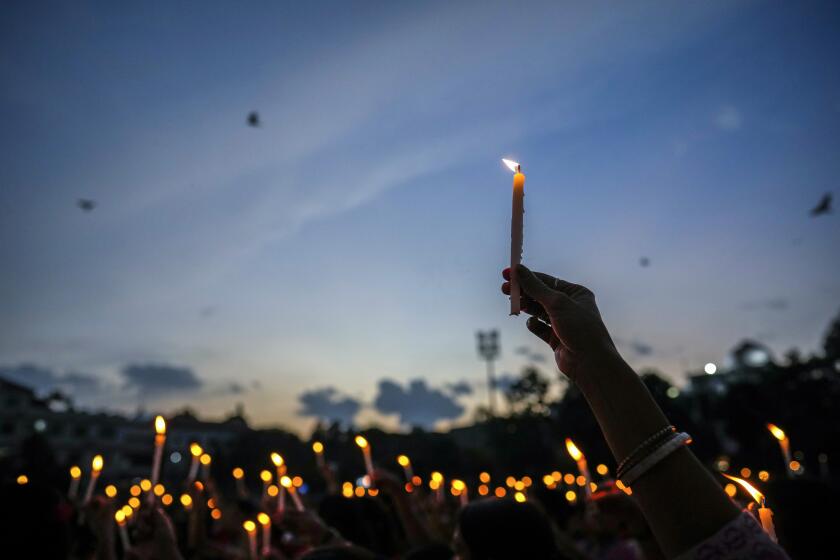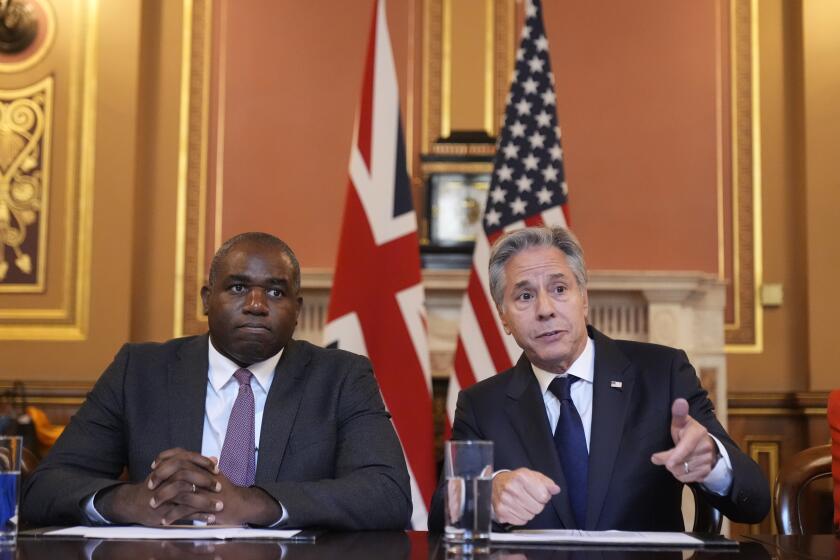Widow is overwhelmed by grief
Michelle Jones was eight months pregnant and more nervous than usual when she gave her husband a hug before he left the house April 19 for a weeklong assignment on the Deepwater Horizon oil-drilling rig off the coast of Louisiana.
“Something deep inside told me to hug him again; then again, and I started to cry,” she recalled in an interview at her Baton Rouge home Wednesday. “He said: ‘You’re being emotional. I’ll be OK. I’ll call you when I get there.’ ”
Gordon Jones, 28, planned to work the week, then take seven weeks off so he could be there for the birth of their child.
At 9:36 the next evening, Gordon, who specialized in applying a lubricant known as “mud” to drilling equipment, called home to inquire about Michelle and their 2-year-old son Stafford.
“His last words were, ‘I love you,’ ” she said, trying not to cry. “Ten minutes later, everything changed.”
The Deepwater Horizon exploded and burned, and two days later it sank. Oil from the well and riser pipe 5,000 feet below continues to gush more than 200,000 gallons of crude into the Gulf of Mexico each day. Gordon, who worked for oil services company M-I Swaco, is among 11 workers missing and presumed dead.
The grief has been overwhelming for Michelle, who is due to give birth May 21.
“I have terrible days and days that are .003% better,” she said. “But if Gordon were here, he’d be telling me, ‘Things are going to be fine. You’ll get through this.’ ”
Studying framed family portraits on the mantel and snapshots taped on the refrigerator, she smiled and said, “Gordon had a wonderful sense of humor.” One showed him standing behind Stafford, helping him swing a golf club, big smiles on both faces.
She her husband spent the final week of his life “doing everything he most wanted to do before leaving home. He and Stafford built a fort in the backyard out of cedar planks and bolts. He began teaching Stafford to play golf. We had a crawfish boil for the entire family one evening.”
On Monday, Michelle and Stafford planted a live oak in the backyard in his memory.
Jones’ former employer, M-I Swaco, has been attentive, making several inquiries about her well-being. “But BP has yet to apologize or make contact with Michelle,” according to her lawyer John deGravelles, who is representing the family. “I figure that is because they are lawyered-up.”
On Tuesday, Michelle filed a lawsuit in U.S. District Court in Louisiana against the rig’s owner, Transocean Ltd., and its operators, BP Exploration and Production, as well as Halliburton Energy Services, Halliburton Group and numerous insurance companies. The suit accuses the companies of negligent failure to properly perform operations and take appropriate precautions to avoid an explosion, and of violating government rules and regulations.
“Our goal is to make sure that this never happens again to any other families,” DeGravelles said.
Gordon’s father, Keith Jones, said his son regarded working on the Deepwater Horizon as a prestigious job.
“It was as big as two football fields, stable, relatively new and considered lucky because it had discovered lots of oil,” he said. “Workers on drilling rigs that discover oil get big bonuses.”
Gordon, who had worked on the Deepwater Horizon for about two years, was one a handful of so-called mud engineers on the rig. It was their job to administer a viscous mixture of lubricants, stabilizing chemicals and coolants into drilling holes.
In its most recent mission, however, the Deepwater Horizon had switched from its usual routine of drilling exploratory wells to preparing a well for production.
“Instead of looking for oil, they went into production mode, which meant they were doing things at 5,000 feet below the surface that they were not accustomed to doing,” his father said. “I have no reason to believe, however, that there was a causal relationship between the new activity and the accident. It is way too early to tell.”
Michelle said the lawsuit aimed to answer the question: Exactly what happened out there?
“Ours is only one of 11 families who lost a loved one,” she said. “There are lots of people hurting right now. Their pain must not be forgotten.”
More to Read
Sign up for Essential California
The most important California stories and recommendations in your inbox every morning.
You may occasionally receive promotional content from the Los Angeles Times.










